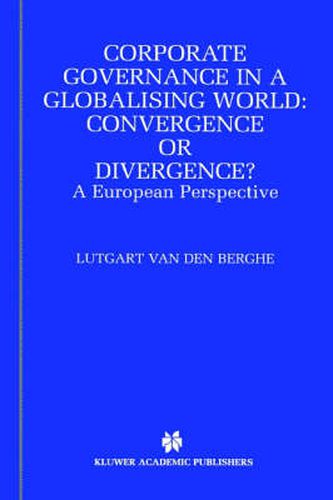Readings Newsletter
Become a Readings Member to make your shopping experience even easier.
Sign in or sign up for free!
You’re not far away from qualifying for FREE standard shipping within Australia
You’ve qualified for FREE standard shipping within Australia
The cart is loading…






This title is printed to order. This book may have been self-published. If so, we cannot guarantee the quality of the content. In the main most books will have gone through the editing process however some may not. We therefore suggest that you be aware of this before ordering this book. If in doubt check either the author or publisher’s details as we are unable to accept any returns unless they are faulty. Please contact us if you have any questions.
This title presents a broad and multi-disciplinary debate on corporate governance systems by integrating academic viewpoints and statistical evidence, as well as field surveys. Based on a large number of publications and studies, the opinions of researchers are grouped into three categories: those that believe in a convergence into the direction of the market-oriented model (with the Anglo-American model as the reference base), those that opt for another type of convergence, namely in the direction of a hybrid corporate governance model (based on cross-reference between different leading governance models), and those that do not believe in global convergence but adhere to diversity of governance models. To test the validity of these three possible routes for the development of corporate governance systems, the authors approached this question from an objective perspective based on statistical evidence. The governance characteristics examined herein include the role of capital markets, shareholding structures and influence, shareholder rights, the market for corporate control and anti-takeover mechanisms, the board system, disclosure rules and accountability issues. To complete this statistical analysis the authors include a field survey based on an inquiry with experts from business, academic and public institutions. Questions focus on the future outlook of corporate governance within the European Union, as well as on the role and format of corporate governance codes and recommendations.
$9.00 standard shipping within Australia
FREE standard shipping within Australia for orders over $100.00
Express & International shipping calculated at checkout
This title is printed to order. This book may have been self-published. If so, we cannot guarantee the quality of the content. In the main most books will have gone through the editing process however some may not. We therefore suggest that you be aware of this before ordering this book. If in doubt check either the author or publisher’s details as we are unable to accept any returns unless they are faulty. Please contact us if you have any questions.
This title presents a broad and multi-disciplinary debate on corporate governance systems by integrating academic viewpoints and statistical evidence, as well as field surveys. Based on a large number of publications and studies, the opinions of researchers are grouped into three categories: those that believe in a convergence into the direction of the market-oriented model (with the Anglo-American model as the reference base), those that opt for another type of convergence, namely in the direction of a hybrid corporate governance model (based on cross-reference between different leading governance models), and those that do not believe in global convergence but adhere to diversity of governance models. To test the validity of these three possible routes for the development of corporate governance systems, the authors approached this question from an objective perspective based on statistical evidence. The governance characteristics examined herein include the role of capital markets, shareholding structures and influence, shareholder rights, the market for corporate control and anti-takeover mechanisms, the board system, disclosure rules and accountability issues. To complete this statistical analysis the authors include a field survey based on an inquiry with experts from business, academic and public institutions. Questions focus on the future outlook of corporate governance within the European Union, as well as on the role and format of corporate governance codes and recommendations.